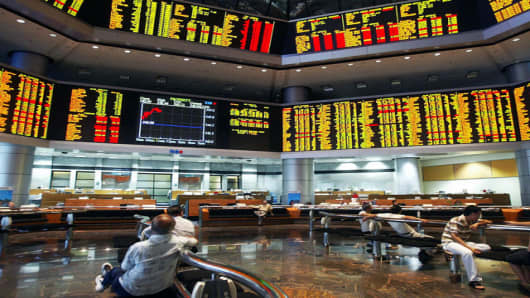Asian stocks slumped to a seven-week low Monday, following a fall in U.S. stocks last Friday, after data showed employment fell in February at its fastest rate in five years, heightening worries about the economy.
Malaysia's KLSE Composite Index was the biggest decliner, nose-diving by as much as 10 percent after a major election upset for the ruling coalition, which lost its two-third majority in parliament.
Growing concern that the U.S. economy may already be in recession sent Japan's Nikkei 225 Average closing 2 percent lower at a 2-and-a-half year low while the broader Topix Index lost 1.9 percent, as exporters sagged after the yen hit an 8-year high of 101.40 yen to the greenback .
Sony finshed at its lowest close in over two years, shedding 5 percent at 4,610 yen. Toyota Motor was also among the losers, following comments from its President Katsuaki Watanabe that the yen has strengthened too much. Watanabe also warned that the outlook for North America appears weaker than what the automaker is expecting.
But Sapporo Holdings gained strength, after U.S. fund Steel Partners said it has raised its offer for the brewer.
China's Shanghai Composite Index fell 5.7 percent in the afternoon session. China Railway Construction made a disappointing debut, rising to a lower-than-expected 11.60 yuan, versus its initial public offer price of 9.08 yuan.
The Hang Seng Index closed 0.9 percent higher, despite having spent most of the session in the red. Gold miner Zijin Mining Group tumbled 6.9 percent at one point, despite having posted a yearly net profit of 2.6 billion yuan, up 50 percent from a year ago.
In Australia, investors cheered shares of AED Oil, sending the stock up 19.5 percent. This came after China's Sinopec Group agreed to buy a majority stake in the troubled oil producer's assets for US$550 million. The broader S&P/ASX 200 Index closed 1.6 percent lower.
Elsewhere, Singapore's Straits Times Index closed 1 percent lower, the South Korean KOSPI ended 2.3 percent while the Taiwan Weighted Index was down 2.7 percent.


